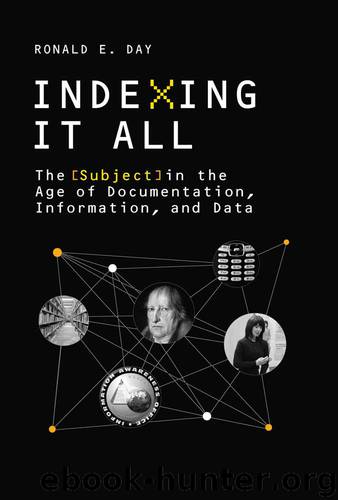Indexing It All: The Subject in the Age of Documentation, Information, and Data (History and Foundations of Information Science) by Ronald E. Day

Author:Ronald E. Day [Day, Ronald E.]
Language: eng
Format: epub
Tags: Language Arts, Library Science, Information Science
ISBN: 9780262322782
Publisher: The MIT Press
Published: 2014-09-19T00:00:00+00:00
5
The Document as the Subject: Androids
“Homo documentator” must prepare himself to take command—with all his senses awake—over the robots of tomorrow. The value of the machine will be that of a servant. “Our ability to overtake machinism lies in our possibilities of assimilating the machine” (Mumford).
—Suzanne Briet, What Is Documentation? (1951/2006)
The statement above from Suzanne Briet’s book raises the issue of taking command of machines by assimilating them. In this process “man” performs this assimilation in order not to become a mechanism of the machine. As we have seen so far, though, this is tricky because information and communication techniques and technologies increasingly mediate our own understanding of the world, including what such technologies are, within the modern documentary episteme. Machinism is not something that one can simply put at a distance, since techne inhabits the type of being that human being is, and modern technologies constitute much of the infrastructures of most people’s worlds today. Moreover, information and communication technologies require an infrastructural enfolding of techne, so that we forget its very presence in transparency. This transparency often involves a double bind, a “yes” and a “no,” to the question of whether the technology mediates or changes information and communication. Even with the telephone, we know that “reaching out to touch someone” (as the old Bell Telephone ads put it) through the telephone reasserts the distance between the two communicators. In the same way, more recently, we see that our online friends come with the caveat of the loss of their not being here, often with the effect of reducing correspondence to mere chitchat. This is the “catch” of all modern information and communication technologies. It is, however, a catch that Plato, too, noted in Phaedrus about the technology of writing more generally, understood as a representation of the speaker him- or herself; in other words, writing as a documentary practice. Humans assimilate themselves to the technologies, but then these technologies shape not only further technologies, but the very nature of human being itself through their infrastructural, psychological, and, increasingly, physiological incorporation into the human environment and body.
The machine often shows its materiality most when it is explicitly made to be like us. The dream remains to make objects that not only leverage our knowledge, not only document certain aspects of our being and expression, but that are us; machines that we can communicate with, as if to another person. Robots that are not just servants (as per the etymology of the term “robot”), but are also companions—the dream of being living texts, as it were. But further, dialectically, androids are dreamt of as things that assimilate us like we assimilate them … a fellow homo documentator that is, yet, more than this … more human by being less so. Not just a “dumb beast” of a person, nor a mere “parrot” of ourselves either, but something more like us. Android robotics offers an interesting example of Hegel’s master-slave dialectic, where the master becomes
Download
This site does not store any files on its server. We only index and link to content provided by other sites. Please contact the content providers to delete copyright contents if any and email us, we'll remove relevant links or contents immediately.
Cecilia; Or, Memoirs of an Heiress — Volume 1 by Fanny Burney(32547)
Cecilia; Or, Memoirs of an Heiress — Volume 2 by Fanny Burney(31945)
Cecilia; Or, Memoirs of an Heiress — Volume 3 by Fanny Burney(31931)
The Great Music City by Andrea Baker(31917)
We're Going to Need More Wine by Gabrielle Union(19034)
All the Missing Girls by Megan Miranda(15958)
Pimp by Iceberg Slim(14488)
Bombshells: Glamour Girls of a Lifetime by Sullivan Steve(14057)
For the Love of Europe by Rick Steves(13911)
Talking to Strangers by Malcolm Gladwell(13349)
Norse Mythology by Gaiman Neil(13348)
Fifty Shades Freed by E L James(13232)
Mindhunter: Inside the FBI's Elite Serial Crime Unit by John E. Douglas & Mark Olshaker(9324)
Crazy Rich Asians by Kevin Kwan(9277)
The Lost Art of Listening by Michael P. Nichols(7494)
Enlightenment Now: The Case for Reason, Science, Humanism, and Progress by Steven Pinker(7306)
The Four Agreements by Don Miguel Ruiz(6744)
Bad Blood by John Carreyrou(6611)
Weapons of Math Destruction by Cathy O'Neil(6265)
